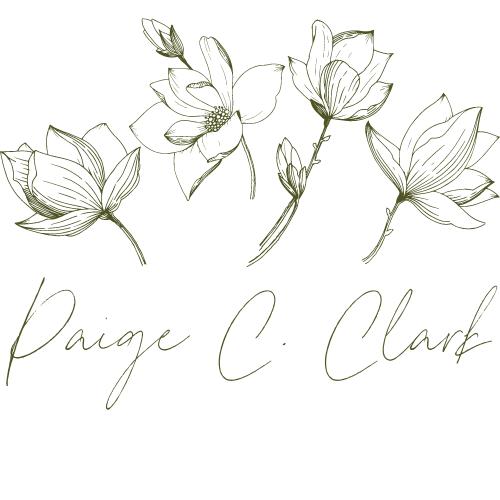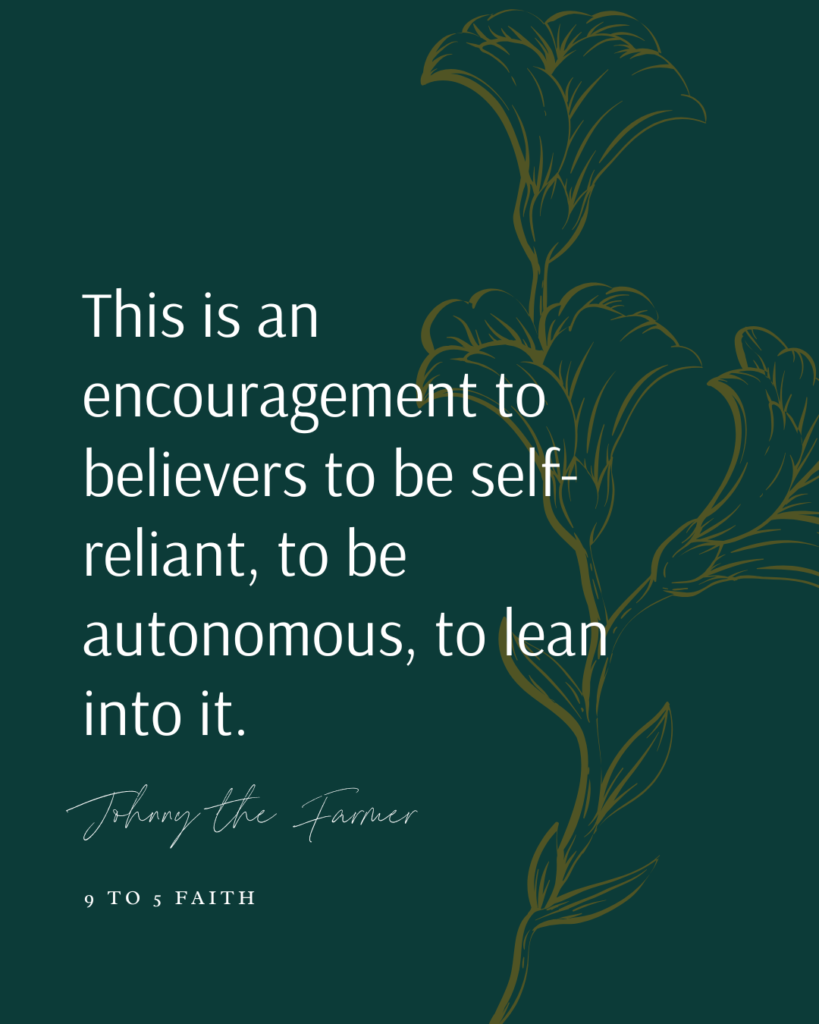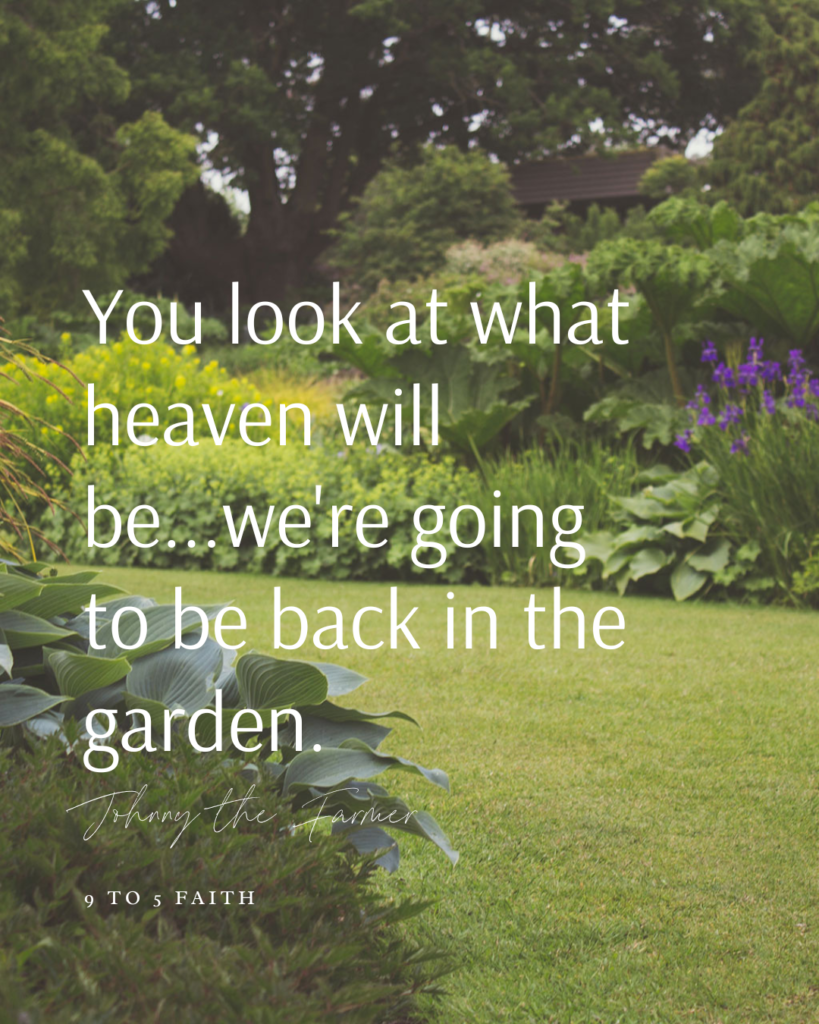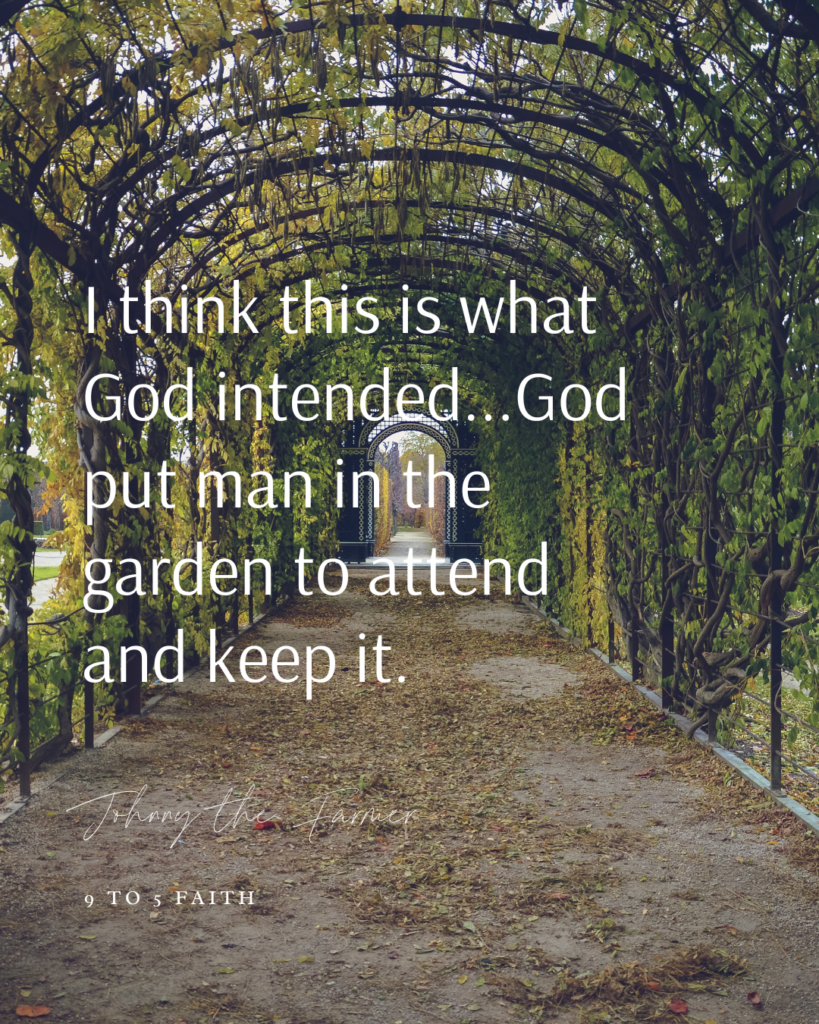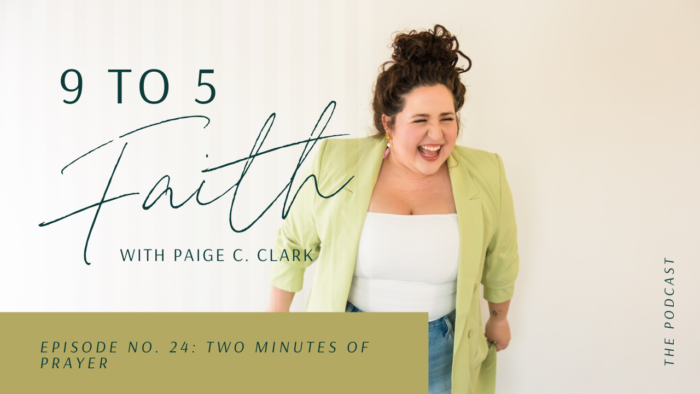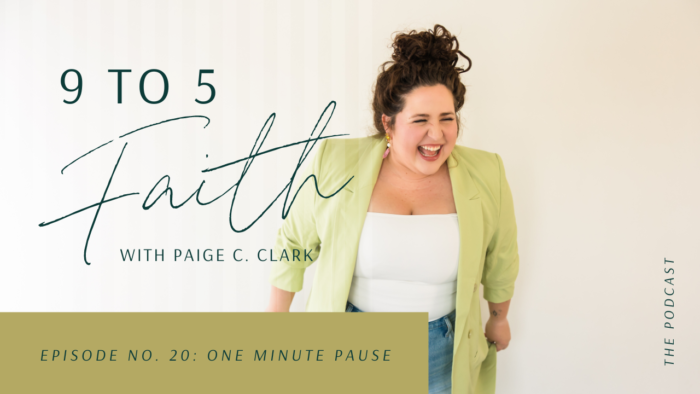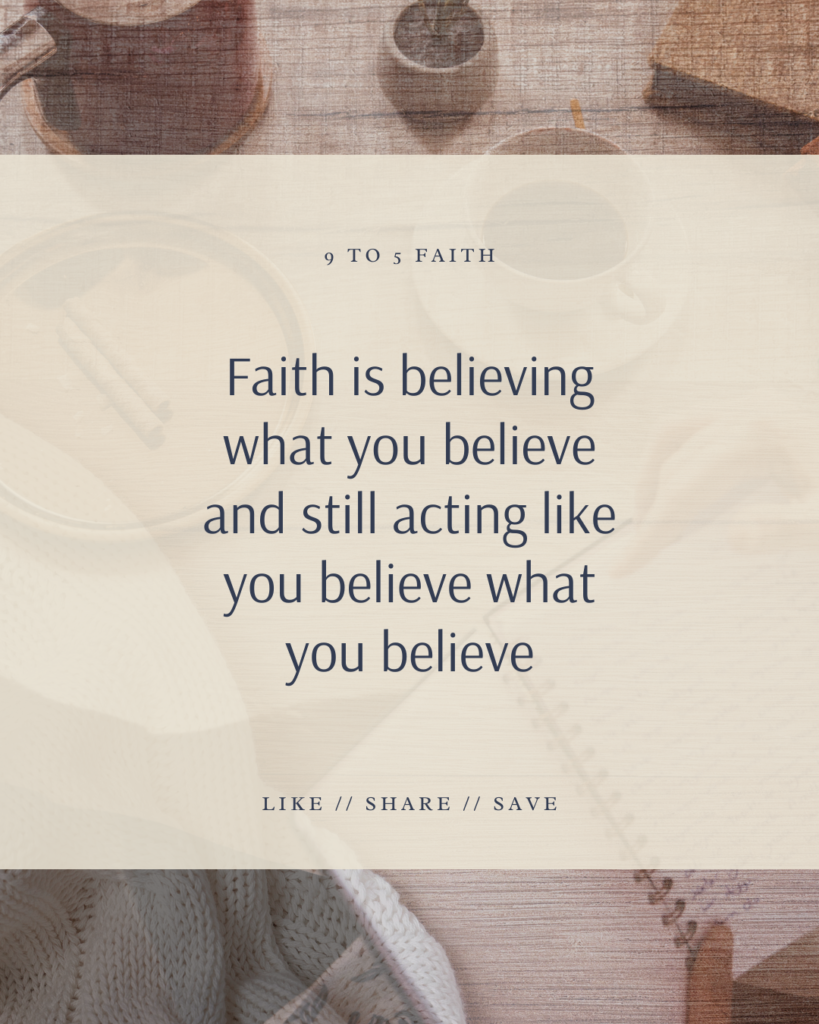This is a transcript from episode 26 of the 9 to 5 Faith Podcast with Paige C. Clark.
Share on Social




Start of Podcast
Paige C. Clark 0:41
Hello, hello, everyone. Welcome to another episode of nine to five faith. I am here with my new friend John Liddell. How are you today? John?
John Liddle 0:50
I’m wonderful. Thanks so much. I really appreciate you having me on page.
Paige C. Clark 0:54
Yeah, I’m so excited. And John, I just love it because I know you do radio broadcasts and so I like to close my eyes and just like hear people and they like, Have you ever radio voice?
John Liddle 1:08
Well, thank you. I really appreciate that. I, you know, you don’t? You’re not really born with a radio voice. Like, almost nobody is. Okay, I didn’t know at the time. I didn’t Yeah, you just develop it over time, or almost nobody, you know, there, there are some people that can just roll out of bed and sound wonderful. But just over time you develop the ability to put the vocal cords together in the right way.
Paige C. Clark 1:34
Now, is it like voice acting where like, you can change it? Or like does it just kind of become how, you
John Liddle 1:42
know, I think it just evolves into kind of how you talk or okay, you know, I’ve got kind of a broadcasting voice sometimes like, Alright, when I’m on K URL, the it’s a little bit more like this. So and, and then when I’m doing sports broadcast, it can get a little bit more shouty because here’s the deal for tonight’s game, the SMU Mustangs really want to come out there and they want to play great tonight. And so there’s just a little it’s a little bit more active. And then if your voice acting, then you can do anything you want it. Yeah,
Paige C. Clark 2:11
makes sense. I think like, I’m a little bit of a writer. And so it’s like writing for your audience. And so yours is speaking for your audience. It’s like, exactly, you’re not just speaking, it’s not the words, you’re saying. It’s how you’re saying it.
John Liddle 2:23
So today, I will try to speak like I normally speak. So I’ll be normal, John,
Paige C. Clark 2:30
fair enough. And I think the fact that I said you have a voice for radio is a much better compliment than the alternative, which is you have a face for radio, which is just like the biggest insult in the world. So
John Liddle 2:42
well. I don’t know if it’s the biggest insult in the world. I mean, especially around when when you’ve been in radio for as long as I have, you know, you hear it twice a week. So it’s, it’s, it’s totally cool. I can come up with better insults. I do for
Paige C. Clark 2:57
it’s not what we’re here for. But I do have those moments when I’m listening to the radio and then like, the evolution of social media when then like, you can go look at people’s faces, you’re like, that’s not what I was thinking at all or when they when you’re reading a book, and then they make it into a movie and you’re like, Oh, that’s not how I pictured the characters at all.
John Liddle 3:16
Yeah, I’m sure I really disappoint people in that way. A lot. What you know, that’s, that’s okay. That’s okay, though. I’m, I am. I am what I am, as Popeye said,
Paige C. Clark 3:28
Yep, that works. So tell us a little bit more about yourself and the radio and the broadcasting and all that fun stuff? Well,
John Liddle 3:38
yeah, if we’re here to talk about our nine to five, my nine to five is more like a 6am to 2pm. And so I work at this news radio station is not news talk, we don’t do a bunch of opinion talk it is it is News Radio. So it’s news and it’s traffic, and it’s whether and I’m an anchor on that station 10 80k rally in Dallas. And then in addition to that, I really my first love is sports in sports broadcasting and so I do a lot just as much as I can possibly get my hands on or my voice on you know, that could be radio play by play for football or basketball or whatever or it could be on the TV which is turned into the streaming side of thing was things like on ESPN plus and stuff like that. So I do a lot of that in this area. And then I just kind of depends on what time type time of year it is. I do some other things on the side as well. Like I’m the public address it voice of the Dallas wings during the summer. I’ve got my my podcast where you’re going which is a total passion project of mine that I’m really enjoying putting my whole heart into. So that’s that’s kind of how I do things right now.
Paige C. Clark 4:54
That’s awesome. That’s awesome. And I feel like, too I have so many questions about the I’m the skill of sports announcing because I can hardly keep my eye on the ball or the puck or whatever game it is, let alone tell you what is happening in real time.
John Liddle 5:13
Right? Well, it is. You know, we do have cheat sheets. And I honestly I just happen to have one sitting here. I didn’t I didn’t prepare this for you like I should have. But this is a spotting board. I actually for a football game that I did a few weeks back, but you know, as you can see there, and I’m gonna get myself away from my microphone. So I don’t know exactly how to do this. But you can kind of see out of the corner here. Yeah, you got the quarterback up there. You got receivers, you got running backs, okay. Okay, here on the bottom, you got the tents and stuff. And so you’ve got all the stats and all the places they’re from and how to phonetically say their names, and all those sort of things. And that really helps me keep things in line. And keep me in line when I’m doing a ballgame. And thankfully, when I do basketball, I don’t have to keep up with nearly as many names. Yeah, I do when we’re talking about football season. Yeah,
Paige C. Clark 6:07
for sure. Man, I feel like I saw like, I saw the genie behind the curtain is like, I get to learn all the things. And that really cool sneak peek. I had no idea. That’s really awesome. I remember when I was in high school, one of our teachers was actually did part time voice work for the LA Dodgers. And so like, I’m not gonna do like any kind of impression, but like, sometimes he would do the morning announcements in his announcing voice. Yeah. And so it was always really fun. Because you would hear him like, Good morning, Glendora. And it was just I was like, fun thing to do. So I always remember, you know, having that kind of connection to to the LA Dodgers, weirdly enough, but Well, it’s
John Liddle 6:55
very cool. It was it was a good impression, though. Yeah, that is one thing I noticed about you and listening to your show. You got a great voice. Oh, thank you. Fantastic voice. Keep going. You’ve got that part of it down.
Paige C. Clark 7:06
Thank you. I appreciate that. And you know, I’d like to, it’s evolved over time, in terms of the level of comfort I had, in talking to other people. My coworker forced me into being on camera and talking on like audio and everything. When we when we worked for a company. And we started doing like live shows and stuff like that. And she forced me to be on camera, and it was so uncomfortable. And then I realized I’m like, Oh, I kind of love doing this. And then you you know, you just get comfortable and you just like it’s just talking it helps a lot when it’s like not in front of a live audience. I feel like that is like a whole other bundle of nerves.
John Liddle 7:44
It isn’t another bundle of nerves. But it’s another level of excitement too. Yeah, there’s, there’s really nothing like talking to people when they’re live and they can see you and stuff. And sometimes I don’t even know what I say just because it makes me so excited. So I can craft it. You should take this show on the road sometime. That would be interesting, how fired up you get and just kind of crazy things. And
Paige C. Clark 8:08
I’m Italian so I’m like very, like active with my hands. And my body movements. It just happens. Now I have like a way out there question feel free to pass. But what is your biggest like snafu when you’ve ever like done, you know, broadcasting or laying, you know, with sports, like the biggest thing that you’ve accidentally said, if you have one,
John Liddle 8:33
um, you know, my my biggest public failure, if you will, it didn’t really come in broadcasting, it came in singing actually I sing a lot Okay? anthems okay. Like, you know, professional sporting events, right area. And so I Rangers game baseball game four years ago. And I did the national anthem. And then I did God Bless America for this game against the twins and everything went great for the national anthem went outstanding. And it was back before all the pitching rules changed and stuff. It was a really hot night. We didn’t have a you know, an indoor stadium, everything was outdoors. It was 100 degree day, it was just ridiculously hot. So three hours later, I dragged myself out there for God bless America. And there’s a lot more to it. But basically the bottom line is I started on the wrong note. I started a little too high. And everything was sounding really pretty good. Up until that final note where I went up there and I tried to hit it and I had no steam left and it came out so wobbly and awful. And I’m not exaggerating when I say it did I mean for me go viral. I’m talking about like, you know, 500,000 views on Twitter, all those sorts of things. Because it was a very, it was a very public failure. But yeah, and that was in front of like, 30,000 people plus whoever was watching on TV. Yeah. So if I mess up now, even on the radio, say something silly or Yeah, you know, get something mixed up or I’d say something’s a touchdown when it’s really not. Yeah, I can really think back and be like, You know what, I’ve been through a lot worse than this, it is going to be okay.
Paige C. Clark 10:26
Oh, goodness, gracious. That’s I’m very sorry that happened to you. But I think part of it is like, owning not our mistakes, but just like owning our humanity and like, humility with it. I was listening to a speaker the other day, and she says, We can either get humble or we can get humiliated. And I was like, yes, yes. That.
John Liddle 10:48
Absolutely. And I laughed as soon as it happened. And, you know, a lot of my friends came to my defense when that happened. And, you know, obviously, if you if you don’t know me, then it was very laughable moment, it was very funny. But you know, my ability to laugh at the moment not to put myself down, but just to say, you know, what, sometimes we screw up and then to get back out there and do it again, is really, really big. And I’ve had a chance to do it on more stages and sing in front of former President Bush and stuff like that, since the bad moment happened. And so, you know, it’s, it’s all worked out, just yeah,
Paige C. Clark 11:26
I’m gonna knock on wood. Because like, I don’t think that moment has happened yet for me. But like, I’m always terrified, because like, sometimes this has no filter. And so like, the first time I ever did, like, live shows and stuff, I’m like, I’m gonna cuss. Like, I’m good. I’m gonna let something slip. And it’s not going to be good. Thank goodness, it hasn’t happened yet. Or when it has, it’s like been intentional and not like accidental and it’s been terrible. So like, fingers crossed that like that can still hold off a little bit. But yeah, that that’s, I believe your biggest fear. Gonna be all right. So tell me a little bit about like, the intersection of like, your career and your faith. And I always like to kind of reel it back of like, did your career start? And then you came to faith? Or have you always been a Christian? Like, take us through a little bit of that journey? And what that looks like,
John Liddle 12:21
I appreciate you asking that. Um, you know, definitely, I came to faith when I was a kid. And okay, but I, you know, I do look at my life. And I’m like, you know, while I have always been a Christian, like, since I was seven years old, certainly the way I was actually submitted and surrendered, and, you know, practicing. Well, I mean, just, yeah, like truly practicing. Yeah, right. But you can even be in church and not practicing it, you can be outwardly saying one thing, and then really not doing it, right. I mean, that’s evolved over time. And so I will say this, as long as I’ve been in the workforce, I’ve been a Christian, I’ve been, I don’t want to say outspoken about that. I’ve been proud of that. I’ve been very, very secure in that. But I really do think over the last few years, that that God has shown me, again, we talked about being humbled, you know, just a new level of humility, even when it comes to my faith, and like what it means to be a Christian in the workplace, I think of myself, you know, 20 years ago, and, you know, we are all idiots when we were 18, or, you know, whatever age that was, but I think of being a server at a, at a restaurant, and, you know, hanging out with all the kids, they were all doing, you know, whatever the drinking, cussing, smoking, drugs, all that sort of thing. And I was, instead of like, meeting them where they were, I was the person that was, like, calling them out for it, or just had my nose in the air, or, like, I can’t believe you guys do that stuff. I don’t do that. Stuff like that. And I just, I just didn’t know how to, you know, humbly walk into his face, and just, hey, let’s let the light of Jesus shine through, you know, do a lot of preaching and if necessary, open up your mouth, you know, right. And that it’s not my job to convict them of their sin. It’s my job to be, you know, a friend to them and to love them. And maybe if there’s something that’s going on in their life that they want to talk about, I can, I can be a friend to them, and I wasn’t I wasn’t that because I just didn’t know. I think I grew up in the in the Baptist Church in the 90s. And so there was a lot of us versus the world type of stuff going on. And I just didn’t know how to handle that. So, you know, I wasn’t doing anything on purpose. I wasn’t trying to hurt anybody’s feelings on purpose, but I’m sure I did. And I’m sure I alienated myself and gave Christians a bad name for, you know, just the type of Christian that I was, I thought I was being a good person, but I wasn’t a good friend, I wasn’t a good, you know, a safe person to talk to. Right, as we say, and I’m, you know, I’m not gonna pat myself on the on the back. But that has changed over the years, right? It’s more of Hey, be their friend for a beat anybody’s friend first. That’s really all I’m here to be. And, you know, obviously, do the right things in the workplace, just like do the right things in life. It’s but you but it but it’s not about, you know, assembling a Bible study at work or something like that, in order to prove that you are a good Christian or something like that, or, you know, separating yourself as if to say, No, I’m above you guys. That’s not what we’re called to do. I don’t think and yeah. And so that’s how it’s changed for me over the years. So I’ve, I’ve always been a person of faith, but I’ve been a less mature person of faith than I am today, when it comes to how I interact with people in the workplace in a phased manner.
Paige C. Clark 16:17
Yeah, that’s fair enough, I think. I think looking back, I’m even writing some articles right now for a series in like September, October. And I’m like writing these and I’m like, if like I’m hypocritical against all this stuff, like, if you go back and like, look at my social or look at my old blogs, you’ll find myself contradicting myself, but I’m basing this and in what I believe and in Scripture, and there’s always that evolution of, you know, where we have been and where we’re at now. And I actually follow this one gallon social. And her handles is I used to be a psychic. And she’s a Christian. And she like came from like, New Age psychic kind of mentality, and spirituality and like, came over to Jesus and the good side, and she has this whole thing of like, why she keeps up her old posts. And she’s like, I want people to see the evidence of Jesus in my life. And that transformation is the proof of, of Jesus. And I was like, Yeah, I like that.
John Liddle 17:29
You know, and I’m caught in this. You know, thing between, sometimes in, there’s not a lot out there, I don’t think you could find on me on social media that you’re like, oh, my gosh, I can’t believe you said that. But, you know, when it is appropriate, you know, just to help other people know, they’re not alone be like, listen, I used to do this, or I used to think this or I was not, right, in this way. And having the humility to say that and talk about, you know, that transformation, that journey that really can help encourage somebody who is maybe a little bit closer to where I was, and whatever area of life. So I think that I really commend that person for doing that. I think that’s, you know, that’s, that’s honest. And that’s real of her for sure. And I think it can be used in a testimony, no doubt. Yeah. And I think
Paige C. Clark 18:26
the problem like some Christians can find themselves in is like feeling, or other people who are not Christians, seeing Christians and feeling like that they can’t relate and like, Oh, you don’t know what I’ve been through. You don’t know what it’s like, blah, blah, blah. And really, it’s, you know, a conversation of like, No, I’ve been in your shoes. I know what it’s like, there’s this really great book. It’s called gay girl, good God. And as by I think, as Jackie or Jacqueline Hill, Perry, I think is her name. And I love that book, because it’s taking a topic where people are just like, You don’t understand. And she’s like, No, like, I understand. I’ve been there. I’ve walked that road. And I think that’s just what sharing our testimony is all about. So Oh, absolutely.
John Liddle 19:15
You know, and some people walk that road. And, you know, they’re doing it, you know, publicly, you know, they just they they’re not they don’t believe in God. And so they are they don’t believe that God’s for them. And so, they do whatever they want to do. Or there are people like me, who have had been Christians have known about God knows what I wanted to do, but I wasn’t doing it and I kind of was, you know, living a lie in areas of my life that you know, but that’s the most powerful part of my story now is, you know, where he’s, he’s taken me from death in that area to life not perfection, but just just life and freedom.
Paige C. Clark 20:03
Yeah, absolutely. Now you work in the media space, which I work in the tech space. So I feel like the stereotypical culture that we might associate with media and with tech is really, really prevalent in that it’s very secular and kind of that it’s difficult to be a Christian, at least that’s a stereotype. Have you found yourself in any situations like that, working in the media or anything along those lines,
John Liddle 20:34
difficult to be a Christian? And I was, I was thinking about this, I don’t find it, you know, difficult to be a Christian in my space. It’s just like, how do I a walk out my faith and I and I, and do it unapologetically, while at the same time, not tried to hit people over the head with a Bible. So you know, and there is a little bit of a line to walk there. And so I say it’s not hard. But then I talked about how I’ve got to toe a line, right, here’s how I do it. And I want to credit, you know, my boss right now, and really my bosses that, really, they’ve given me kind of editorial control. I don’t remember ever a time where I’ve had to dial back something I’ve said or okay, no retract or like, well, you really need to talk about this, you know, topic, because everybody’s talking about it really doesn’t happen in my particular space. And I don’t. And so, now, that isn’t to say that I don’t talk about issues, or I don’t interview people about issues that they feel are important that I don’t necessarily personally, if you got right down to it agree with, but as a member of the media, which, you know, I just pause every time I say that because it gets such a negative connotation. Right. Right. Right. As a member of the media, here’s, here’s, I’ll, I’ll use this word in front. Instead, journalists as a journalist, yes, I need to ask questions and tell stories from all sides. Right. And that is important to me, that like really important to me, and I’m not, I’m not a perfectionist in that way. But if I tell a story from one side, I need to be open to telling it from another. And I know that I think that’s hard for everybody. Like, it doesn’t matter what you believe that’s hard not to bring your personal beliefs into it. Yeah. And sometimes I do let people into it a little bit on the radio, whether it be like my, you know, my belief in God or something like that. But when we get down to those really controversial topics, yeah. Abortion, guns, things like that. I don’t think religion belongs in those areas in those spaces. I don’t think my belief system from a religious perspective, from a relationship with God perspective, like, it really doesn’t like factor in it. For me personally, I know, other people believe differently. Yeah. You know, and so, when I’m doing stories like that, I can tell both sides because I really do believe in unity, I believe in bringing everybody together and that we have a lot more in common than we do. You know, not in common. If people want to blame the media for putting people on sides, I don’t know. Yeah. I don’t know. Whatever blame you like, people feel like they need somebody to blame. Like, I feel like I need somebody to blame because I don’t want to blame the media. So I want to blame politicians. Politicians, blame the media, politicians blame, you know, the the right blames the left and the left blames the right. We’ve got to stop blaming each other man, we’ve got to stop blaming each other. It’s, you know, I so you believe different than leaving me. All right. Okay. No big deal. Yeah, you know, I don’t let’s let’s move on. And let’s think about some things that we can agree on. Yeah. Let’s think about some things that are basic to humanity. Not basic to what the right ones or what the left ones. I know, this has been a rambly answer. No, but it’s not. It’s not easy. It’s not easy to answer. So anyway, all that to say, I am not censored as a member of the media. I’m not told what to say. I am not slapped on the wrist for it. Seeing something that’s more right leaning? You know, because I’m not I’m not at all. And I. And I hate it if if people are in that situation, but that is not my experience, my experience is, I want to connect with people, I want to unify people, we do want to entertain people a little bit, and we want to inform people. Yeah. And if I’m doing that, then I’m doing my job correctly. And then, on top of that, you know, just for me, personally, I want to do it as a person that carries hope, and it carries positivity and carries the light of Jesus as well. Yeah, so I’ll stop talking on that answer. And I’ll let you dive into anything specifically that interested you in what I had to say.
Paige C. Clark 25:49
I mean, it was really interesting to me. I think the one thing I just talked with someone else on on the on the podcast about this, but what I tend to go for is looking at, you know, when when your political conversations are, like, top of the headline conversations, I think, for the vast majority of issues, quote, unquote, issues in the American life. We all agree on the outcome. For the majority of things, we all agree on the outcome, how we accomplish that outcome is what is debated and what is fought over. So for example, guns, right? We all want less people to die. Like, like, ultimately be people who are for pro gun or whatever. They want to not die. And people who are, you know, trying to restrict guns, they want mass shootings not to happen. At the end of the day, everyone wants people to not to die. So like, we agree on that. And I think once like people are able to like be like, Okay, we agree on the finish line. Like the disagreement is not on the finish line, the disagreement is how we get there. I think that we’re able to touch on each other’s humanity a little bit more.
John Liddle 27:31
Yeah, I agree. I certainly agree with that. And it doesn’t help. And, you know, I don’t want to make it sound like I’m against people on the left or on the right, because I’m really like, not again, I want to unify everybody. Right, when something happens. And then the first thing the the people on the left do is I don’t want your thoughts and prayers, because they’re attacking religion. Yeah, they’re attacking. You know, the fact that obviously the right doesn’t want to give up their guns. Right. And then the, and then they like, absolutely blame it on people that want to hold on to their guns, like when that is that is the opposite of unifying. Right. And I don’t know how it helps anybody. Yeah. I don’t know how it how it truly helps the victims to point a finger at like, truly innocent people. Right. You know, and I can’t believe I’m saying this, because I really, honestly, I want to I really, I’m really, like, super down the middle on almost everything. Yeah. And so I’m not trying to attack people on the left at all in saying that I just, I think that’s just an example. Right? Because, yeah, there are right leaning people who do that as well. You know, when something goes bad in the economy, like we’ve seen over the last few years, they point the finger, like, like you said, the end is we all want a good economy. Right? Right. And so whoever happens to be in power, if the economy goes bad, then the opposite party is going to point a finger at the current administration. Right, that’s exactly what we’ve seen. Yeah. Yeah. With these little stickers on the gas pumps that you know, of President Biden saying, I did that. I mean, this is the that the it’s all disgusting. It’s all you know, pointing fingers and blame in order to elevate your position. And it’s it’s the part of covering the news and covering politics that really, like sometimes physically hurts me like yeah, because i i I am a unifier. I will I’m the guy that wants everybody to get along. Right. I’m an encourager, and I am. I’m really, really tired of seeing people. Yeah. Point across the island shouting at each other.
Paige C. Clark 30:15
Yeah, for sure. Like all us. I mean, you’re in Texas, right? Yeah. And so like, we’re border states right here, right? Like, you look at immigration and illegal border crossings. And, like, at the end of the day, again, both sides just want those people to be safe and have you know, to be healthy, and, you know, not to be taken advantage of. Right, like, but where that happens, and how that happens. looks very different. Do you feel like, I’m not gonna, that was a really terrible like, way to roll into my next question. I’m not going to ask you a question about immigration. But that was just another example. Okay, cuz I ain’t
John Liddle 30:59
got no answers. Ah,
Paige C. Clark 31:00
segue. Do you feel like you have kind of the freedom? You said you weren’t centered, meaning like, people are not like, you know, quieting your voice in terms of like, what you say and how you say it? Do you ever feel like you have the right? Obviously, you have the legal right, but kind of the right in as a journalist to not report on things. Something crosses your moral boundary? Or has this gosh,
John Liddle 31:44
yes, no, no, I have a right to not report on something.
Paige C. Clark 31:51
Meaning Well, I mean, it’s something being like going to, like, say, a story comes across and you like, tell it like your boss, like, Hey, I’m really uncomfortable. reporting on this, we’re talking about
John Liddle 32:01
I’m just trying to think of what you know, if something is newsworthy, and that kind of brings into question like a whole nother fish to fry, which is what is newsworthy? Yeah. You know, something that is newsworthy to Newsmax is not newsworthy to CNN. Right. And, and so, and vice versa. Right. And so, you know, for us as a very down the middle organization, you know, we have not been like, after Hunter Biden’s you know, laptop or whatever, the last five years, we don’t care, you know, Intel, actually, something happens, you know, with the, you know, the widget has a little bit, but you know, it’s it’s not something that we’re on, we’re on a witch hunt against the left. And the same thing for anything on the right side, anything that’s on the fringe, we’re not going to go after it. You know, we’re going to look down the middle. And so it kind of depends on the news organization. And then you got also got to think we only have so much time as well. So I know I’m answering your question with that’s not the whole question. Yeah. Here’s the deal. If something is newsworthy, and there’s no doubt that it’s newsworthy, I’m, they write the story for me. I’m gonna read it. Okay. I’m not going to. Because I mean, the, hopefully we’re doing the right thing. The only thing I would admit, omit is if somebody unintentionally wrote the story with bias, and there are words in there that I shouldn’t say I need to say something more down the middle. I’ve done that before. Right? Somebody writes something from the left perspective or the right perspective, I try to look for those buzzwords and take them out. Because I don’t want to inflame anybody on either side and I want to look at it. Middle. Okay, like what we experienced in our, our jobs, is it, it goes to, you know, there is an opinion on what happened on January 6, the right, right, people. CNN uses the word insurrection, CBS News uses the word insurrection, you will not find Fox News using the word insurrection or something like that, or maybe they say attack on the Capitol. I don’t watch enough, all right. But, you know, even like phrasing like that, you’ve got to be very, very careful. Yeah. Because you don’t want to even appear to have bias and that is even more important to me. Because while I work with people where I know their leanings or left or right, yeah, I truly am like somebody that’s now in the middle. Yeah, like I take some convincing from either side. And so I truly don’t want to inflame anybody. Yeah, I don’t want to give anybody for any reason to tune me out because they think I’m left leaning or right leaning. And so, you know, another thing like that in the news is to use the word, illegal immigrant, D word migrant. That is, and
Paige C. Clark 35:17
I tried to be I don’t know if you notice when I chose my words I was like, okay,
John Liddle 35:22
exactly. And so you, you get the sense of, of what I’m saying that words really do matter. Yeah. And even if Okay, I think it’s I think it’s factual, that, you know, those are the people that crossed the border illegally are in the country illegally. And so you could say illegal immigrant, but over time, phraseology changes, and all the sudden you’re more in one camp than the other simply by using a phrase. Yeah. Simply by using the word insurrection. Yeah, it basically, it reveals it out that I’m, then I’m left leaning. And, and so you’ve really got to watch that stuff. So that’s the only part that I would omit. Yeah. Okay. If I’m telling a story, if I’m giving a story that I am I, you know, doing it in in as unbiased away as I possibly can?
Paige C. Clark 36:20
Yeah, yeah, no, I appreciate that. And I think too, like, I totally know what you’re talking about in terms of like, choosing your words, I remember when the George Floyd situation was happening, and the company that I was working for, released a statement. And I remember trying, I’m definitely I was definitely more right than my co workers. So like, I tried to give the voice of the people who would not against like, right or wrong here, but like, when we’re putting out this statement, let’s make sure it is very all encompassing, in terms of what we can say about it, and I remember, I mean, I tried to push back, it wasn’t well, it wasn’t received. But they they had said Black Lives Matter. And it was all about the capitalization of those letters. And I said, if we use black lives matter, it was the whole whole thing. And it was more in regards to the general idea than the organization. I said, if we take away the capitalization of those words, we’re not aligning with the organization versus where if we were to capitalize those words, it would look like as if we are aligning with the organization. So and it was beyond my paygrade to decide whether or not we’re aligning with the organization. But I want it to be a voice of like, hey, from like an outsider’s perspective, and someone who believes very differently than a lot of the majority of employees here. This is how it could be perceived as as US aligning with this organization that, from my perspective, we have not committed to aligning you to. And so it’s, I totally get what you mean. It’s just like those little things. Now, they still live and capitalize it, and then had to deal with that feedback. But I spoke my piece, but you have to do it very strategically.
John Liddle 38:31
Yeah. And, you know, it. It is interesting. And, thankfully, things like Black Lives Matter. You know, we are not as a media organization. We don’t get behind any organization. Right, you know, we tell the stories. And so that is very, very helpful to us that we don’t have to go into that. But even even then, you know, you’ve got to be careful with words like before, in, and this just goes back to being factual, you know, before the police officers were convicted, you
Paige C. Clark 39:15
was that murdered?
John Liddle 39:17
You couldn’t call it murder. Right, when they but when they were convicted, it absolutely is murder because they have been convicted. And no, I don’t want to say most people don’t get that. But a lot of people online. You know, they just Yeah, they just don’t understand. You know, they they see what happened in the, in their judging in their minds. That’s a murder. And it didn’t add up. It was by a jury. Yeah. A jury said yes. Yeah, it is murder. And so you had to make sure before the verdict came in. Yeah. Yeah. That Derek Chauvin was accused of murder, not that he murdered George Floyd. Right, you know, and so, yeah, there are Oh, yes.
Paige C. Clark 40:01
So many situations, what was
John Liddle 40:03
the situation bear trap? So we can, you can, too. But thankfully for us, thankfully, I’m so grateful that I have the just just the desire and the what I can fall back on. Alright is I can look into it and see if it’s if it’s truth or not. Is it factual? That’s all I’m after? Yeah. Is it factual?
Paige C. Clark 40:26
I’ll give this account a shout out because I think that they do a really great like way of kind of splitting things down the middle is the pourover news. It’s kind of a Christian based organization, but it but it reports the news, and always tries to one take a very, like, factual approach to it. But then also, they, they always conclude it to like, how should we as Christians respond to the situation. So I’ll give them a little shout out because I really enjoy reading their content, if you are ever like, I don’t know how I should feel about this as a Christian, they kind of help you there. So let’s get Yeah, pourover news, I think, I don’t know if they have a website, I’m, I’m a social media person, I follow them on social media. Um, talk to me a little bit about like, A Day in the Life a week in the life of John, and like, what does your faith and church involvement look like? Are you able to, you know, are you traveling a lot? Or are you you know, pretty homebound? Or what does that look like? Are you able to be involved in your church, except I’m,
John Liddle 41:40
I’m pretty DFW bound. And I’m very involved in my church. And so it’s gonna mean every Sunday and I serve with the kids, and then I go to the actual service. And then I have got a, a small group of guys that I’m involved with, and we meet every Wednesday night at a taco shop near church. And we have an hour and a half of conversation about what happened in the, in the service that week. As far as what what we talked about like this last week, we talked about forgiveness. So we’re gonna dive deep into forgiveness for an hour and a half, in kind of get into that. And then, in addition to that, I also am a kid’s leadership experience, coach, and so this is a deal with you for fourth and fifth graders at my church, where it’s like, it’s, it’s kind of like their first serving opportunity, like formal serving opportunity in the church. And so get opportunities come
Paige C. Clark 42:37
Yeah, love it. Well, yeah, absolutely.
John Liddle 42:39
I mean, love, just like, you know, the end just and we also get to dive a little bit deeper into concepts than we do in a typical kids service on a Sunday. And so we don’t just go into all right, this week, we’ll talk about how Jesus has forgiven me, we go a little bit deeper into that, we’ll talk about that, you know, we’ve got these Wednesday gatherings that we do monthly, and then we get together with this particular group of kids like this pot of 10 kids. And, and we just, we go a little bit deeper, and then they’ve got objectives that they’re, you know, trying to think about all month, and it could be like, Hey, do an extra chore at home, if we’re talking about service or, you know, meet another kid at school and talk about what they want to talk about. And it’s just, it’s wonderful. It’s going to be my second year involved in it. It’s a school time thing. And it’s just, you get so much joy from seeing kids light bulbs go on with these with these concepts that are hard for us as adults to get sometimes, you know, what? Why should I forgive? What’s the meaning of forgiveness? Why, yeah, you know, what’s the what’s the upside here? And so it is just a really joyful time. So those, those are the main things that I do with with my church, and yeah, in Texas right now.
Paige C. Clark 44:07
Yeah. Now has your schedule. Like maybe it has allowed for you to be differently involved? Or maybe it’s hindered your involvement in your church just because you are working a little bit weirder hours?
John Liddle 44:21
Well, this is a great conversation, because, I mean, I had an opportunity last year to get involved with kids leadership experience, and it would mean giving up several times during the year money making opportunities for myself opportunities to do ballgames which the ballgames I do, you know, they’re, you know, freelance basis. And so I don’t do that game, and I don’t give that $400 But I committed to this thing. I committed to, you know, this is something that God has called me to do during the season. Then I’m going to turn that game down. And so it was A great thing that God called me to do, because it really, like, helped my trust in him financially. You know, and just being like, God, if, if you want me to do this, then you’re going to provide for me, I don’t have to think that, oh, I can’t make it to church because I’ve got work. Yeah, no, I can choose to make church, I can choose to make my relationship with God, my service, how I’m working with these kids a priority. Like if we say that, you know, hey, God’s first in my life, and then my family, and then my work. We, we need to follow through that with our actions. And if God has called us to something, then we need to say no, to work. Yeah. And it really gave me an opportunity to do that. And it wasn’t an easy decision to make. And sometimes I was just like, it was like, gritting your teeth, and, you know, just bearing it and being like, Okay, God, you told me to do this, I don’t necessarily want to do it. But, you know, just either believing that God’s going to make up for those finances elsewhere, or that I don’t truly need that money that, you know, it’s yeah, I’m gonna I’m gonna get by anyway. And so that was a really like, an another level. Like, God’s always taking us to another level. He’s always challenging us in some way. And if you’re not feeling challenged right now, then you’re probably not growing. And I, and so, you know, we’re supposed to thank him. For those times, when we’re challenged, we’re supposed to thank him for those lessons that he’s teaching us. And so that was definitely the biggest lesson in the last year. So let’s see what kind of lessons he’s got for me coming up here. Because, you know, you know, we we never stopped growing as, as Christians were either growing, or we’re, you know, giving up some ground that God has helped us take, and let’s keep plowing forward. Let’s keep taking ground because that’s the most important thing in our life. It’s not, it’s not work.
Paige C. Clark 47:23
Yeah. My pastor always says, especially like, mostly speaking to like, obviously, Western culture, because we live in America. But he says, you know, here in Western culture, we show our affections with our time and our money. So how are you spending your time? And how are you spending your money? And do those things line up with what God is asking you to do?
John Liddle 47:47
And even these days, I think you would agree with me that time is, is even the biggest people can throw money at stuff because they make it right. And but they, they don’t have to maybe they’ve got just too much money in the Yeah, that time is the bigger sacrifice. Yeah, you know, and time is always something that we’re looking for more of. Yeah. You know, and so rearranging our time, hey, he’s absolutely right about money, too. But at least in my, in my recent few years, the time putting God first with my time and putting my family next with my time is your that’s the biggest test for me. Yeah, for sure.
Paige C. Clark 48:36
Yeah. And I think that’s also why I just like love these conversations on this podcast, because we spend 40 hours a week, roughly, the average person spends 40 hours a week working, and how are we spending that time? And how can we use that time to be God honoring and God centering and, and not see it as like, just something that we do?
John Liddle 49:02
You know, and I think I just love that our church had a chance to for almost six months, we went through a series called Hope carrier, where we talked about, you know, how we can, you know, carry hope into the world in every single area. And so, yes, that includes church. Okay, how are we, you know, carrying help in church, and how are we carrying hope and family? But then how are we carrying hope in education? And so that’s kids going to school and how are we carrying hope in, you know, whatever kind of job that we have, and it was so eye opening to, I think, as a as a church family to go on this journey together, of just trying to figure out how we can be more intentional about that and not put Our job in a box over here in church in a box over here and family in a box over here. You know, it’s all, like, it’s all supposed to be God honoring, and it’s all like part of this life that we’re living, you know, that is first and foremost, to honor God, and to love others. And you know, and so, for me, it, it was something I was, I felt like I was already kind of passionate about, but it definitely helped me know that whatever I do, whatever I do, I can do it with the spirit of carrying hope. And that could mean answering an email, that could be in just saying hi to, you know, the security worker that’s downstairs, it’s about to fall asleep, because she’s been there, you know, overnight, and it’s 6am when I get to work, and you know, just making sure to greet her with a smile, and, you know, in, in being intentional about conversations and meeting needs, that we see as well. And there are just a lot of opportunities for that there’s even opportunity for me in my job as a sports broadcaster, because, you know, how much am I able to keep it about positivity? How much am I able to just kind of brag on these, I do a lot of college games. I was gonna say kids, brag on these kids, and you know, just their, their God given abilities, quite frankly, maybe I don’t say it exactly like that. Right. You know, I’m, I’m, I’m heaping praise on lifting others up more than I am, you know, tearing down, right. And it’s become through, you know, the last year or so a lot more natural to do that. And it’s like, you don’t even bat an eye. Yeah, almost anything, almost anything that we can do, whether it be social media technology, it you know, certainly health care, media, whatever we do, we can do it for the glory of God, we absolutely can. And, and, and so we don’t have to worry about how do I bring God into my job? How do I do, you know, if you’re just walking with God every day, then I mean, like, you’re literally carrying
Paige C. Clark 52:32
the Holy Spirit pour from you.
John Liddle 52:35
Absolutely. It’s literally you’re literally carrying it into your workplace, and you don’t have to let the workplace or wherever you are, impact, you know, you are impacting, you know, God is impacting the space around you. Because, you know, you carry that incredible connection with God, the Holy Spirit with you, wherever you go in wherever you go. It’s, it’s love and joy and peace and patience and kindness and goodness, and faithfulness, and gentleness and self control. And that’s how you walk. And so like, you know, and you can do that in your relationships with your family, all day, every day. And I hope I don’t make it sound too simplistic, because I know, everybody’s, you know, that’s having trouble at work is thinking like, but I don’t know how to deal with this difficult co worker. Yeah, go first, you know, you can just decide going into it, that you’re going to love them no matter what. And aside going into it, that you’re going to respond rather than react, you are going to make sure that what ever interaction you have that person that, you know, the fruits of the Spirit are coming out of you. And, and not, you know, the anger and the anxiety and stuff like that. And, and, and truly, you know, just being mindful of that, just like truly being mindful of that, that that life isn’t happening to you that these circumstances aren’t happening to you know, you are carrying hope into the world and you are actively pushing out these fruits of the Spirit that, you know, God’s in control of that and you’re in control of that, you know, you were empowered. You are not a victim. Yeah, and and I know that can be tough to be aware of in the circumstance, but it’s certainly how what gives me peace as I walk into work on a daily basis.
Paige C. Clark 54:50
I love it. That was a great way to kind of finish up with all of this John. One question I always like to ask everyone at the end of my show is what is one faith building practice, that our listeners can go out into the world and do to help them grow their spiritual life.
John Liddle 55:07
Oh, I love this. The best way to grow your spiritual life is through community. It just, it just is. And yeah, I mean a prayer and yeah, absolutely pray and Bible reading is, is wonderful. And actually, you know, just go into a church service, that’s great listening to praise and worship music. Absolutely. You know, tithing or giving, however you feel led, that is absolutely a faith building exercise as well. But if you want to actually, you know, grow exponentially. It’s all about community. It’s all about finding a group of people. And thankfully, where we are, right now, in the world, we can do that in person again, hallelujah, praise the Lord. Yeah, you know, and, but it’s finding that community, that group of people that challenge you, and you decide that vulnerability is your superpower, and you let them see you. You let them see you who for who you really are, and you find those people that aren’t going to judge you, you find those people that are going to benefit from you sharing that you have this struggle, because maybe they have it too. Yeah, you know, a group of like minded people, normally, it’s guys with guys and girls with girls, we just tend to go through similar struggles, it just tends to work out a little bit better. So I do want to encourage that. And, and just being honest, and I can’t tell you how many times in our circle, we’ve had people say, Man, I’m struggling with this kind of addiction, and it could be substance or you know, what we’re looking at, or, you know, whatever. And just getting that out there in the air. getting that out there and into the light. That is what helps it, you know, take you to a different spot with God. Because then that person can pray for you, they can hold you accountable, they can look at you without judgment and say, John, I have been there, I totally get it. And you may not feel like you’re worthy right now, but you’re worthy. Here are some verses that say you are. Here’s a remember, I know you know this, John, but remember, you know, Jesus died for this, you know, and you don’t have to be bound by this anymore. You can, you can give this over to God over and over again, no matter how many times it takes and you can have victory and you can have freedom, even when it doesn’t feel like you can And I will walk with you on that. I’ll text you about it and ask you about it. Maybe you’re having trouble, you know, not exploiting it your kids or you know, yelling, you know, having arguments with your wife, maybe your marriage is falling apart. Do not suffer in silence. Yeah. There is so much strength in a community of people that will lift you up that will pray for you that will, again hold you accountable. And that will love you for who you are right now. Not for who you’re pretending to be. And so there is life changing community. And I know I if I was gonna say something about this western culture right now is we are becoming more isolated. That is statistical. Yeah, that is, you know, that is not me editorializing. That is happening. Yeah. You know,
Paige C. Clark 58:53
across all nations after the past three years. Oh,
John Liddle 58:56
absolutely. Yeah. And, you know, isolation, it creates so many problems, addiction, mental health problems, things like that, you know, I was telling somebody the other day, when I only have myself to talk with, you know, there’s nobody to if I if I get in a bad way, if I’m not in a good mental space. There’s nobody to counteract that and tell me, you know, and remind me of who I really am. So, community is the hack. Yep, it is absolutely the hack, and I love it, commit to it. And make it a priority. Just kind of like circling back to what we were talking about earlier. Don’t miss it for anything. Don’t be like, Oh, I’ve got to work around today. No, don’t miss it for anything. Get there. And I’m talking about a group, a small group of people. Okay. Yeah. I love that. You go to church on Sunday. That is awesome.
Paige C. Clark 59:56
I’ve done that. Someone who knows your name and Yeah, exactly. And
John Liddle 1:00:00
Exactly, yeah. And so that’s, that’s the hack is community love it.
Paige C. Clark 1:00:04
I love it. Thank you so much, John. Now where can people find you connect with you listen to your podcast where we’ll link to everything in the show notes, but tell them here as well.
John Liddle 1:00:14
I appreciate that a lot of places to find me. But let’s talk about the podcast. It’s where you’re going.org, where you’re going.org. And you can find us on all the social media sites as well. But it’s just a podcast, about the fact that with God, where you’re headed is so much better than where you’ve been, or even where you are right now. Yeah, where you’re going and who you’re becoming. There’s a lot of hope for that. And so we talked to a lot of people that have have been through the wringer. We’ve all been through stuff, right. Yeah. And it does not necessarily that our guests have it all together. But they are willing to say no, here’s where we’re, you know, I haven’t had it all together. And here’s what you can learn from it. And so that is the heart behind the podcast, the whole behind the podcast, and I just, I want people to have hope. And so where you’re going.org is the website and you know, wherever we are, we are everywhere podcasts are sold, YouTube and iTunes and Spotify is the podcast.
Paige C. Clark 1:01:19
Thank you so much, John. Now, can I ask you a favor? Usually I close out this show by telling everyone thank you for listening. We’ll catch you next week. Can you do it but in your announcer voice?
John Liddle 1:01:30
Okay, fantastic. I can do it. Yeah. All right. Are we ready to go?
Paige C. Clark 1:01:35
Yeah, let’s send this out.
John Liddle 1:01:37
Fantastic in 321. Thanks so much for listening to the podcast this week. We can’t wait to have you back next week. Make sure you rate and review and subscribe to pages podcast nine to five. Can’t wait to have you back with us next week for the latest edition. We’ll see you next time.
Transcribed by https://otter.ai
